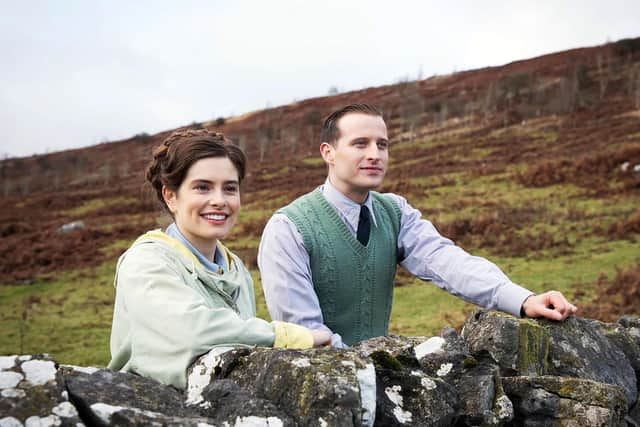Yorkshire's All Creatures Great and Small writer Lisa Holdsworth reveals industry discrimination in Leeds-based Candour TV documentary
and live on Freeview channel 276
Lisa Holdsworth, who wrote the Andante episode of the hit show based on James Herriot's stories, spoke to Leeds-based Candour TV, which has collaborated with the region's Screen Industries Growth Network (SIGN) on the the Industry Voices documentary film series.
The films recounts the experiences of people from diverse backgrounds in the sector and explores their views on how things need to change.
Advertisement
Hide AdAdvertisement
Hide AdResearch has shown that discrimination against groups including Black, Asian and minority ethnic people, women, disabled people, LBGTQ+ professionals and those from poorer backgrounds means that many people are disadvantaged or held back in their careers.


Many of the sector’s diversity programmes, strategies and schemes have "failed to make an impact", say SIGN and Candour.
In each episode, which can be viewed on YouTube, a screen industry professional tells their own story of discrimination or lack of opportunity based on prejudice towards their race, ethnicity, gender, disability, sexual orientation, class, background, regionality or a combination of these things.
Ms Holdsworth, who is from Leeds and came back to the city at the start of her career, said: "Everybody said the same thing, which was 'You will not get work in Yorkshire' because I don't think people consider regional work to be real work. But the fact of the matter is, I've never been unemployed.
Advertisement
Hide AdAdvertisement
Hide Ad"The biggest barrier is the assumption that is made about you as you walk in the room. Still, 20 years on, I get asked the same set of questions at the start of one of those meet and greets when you go and meet a new production company. 'Oh, take you long to get down here?'. It's only a couple of hours on the train. 'Do you stop overnight?'. 'Do you get down to London a lot?' And so that regionality is immediately part of it.
"I'm often aware that I'm underestimated because of my northern accent."
All Creatures last year became Channel 5's highest-rated drama commission ever after reportedly being passed up by the BBC.
Ms Holdsworth also has writing credits on shows such as Midsomer Murders, New Tricks, Waterloo Road and Ackley Bridge.
Advertisement
Hide AdAdvertisement
Hide AdSpeaking more generally, Ms Holdsworth added: "I think there is a very limited worldview in television. I don't think it's done deliberately, I think that most people work in good faith."
She tells the story of an American producer who told her of feedback another professional gave them about her that she was "very northern".
"For him (the American), northern was just geographical but actually what that other producer meant was probably that I was working class."
She said she wanted to see more Black, Asian and disabled commissioning editors at the major broadcasters, a move which she said could be made "tomorrow".
Advertisement
Hide AdAdvertisement
Hide AdOther documentary contributors include Hull director of Northern Soul Sean Macallister, and David “Sideman” Whitely, a former BBC radio DJ.
Mr Whitely said: “I feel like I’d be way further along in my career right now if I had a London accent...In terms of race, I’ve just felt like that has determined what I’m picked for, what I’m seen as and how I’m viewed.”
Andrew Higson, director of SIGN and the Greg Dyke Professor of Film and Television at the University of York, said: “The issues raised by participants such as Sideman highlight entrenched discrimination within the screen industries.
"Whilst these issues are not new, progress to tackle them and effect real change has been slow.
Advertisement
Hide AdAdvertisement
Hide Ad"At SIGN we aim to champion the cause of diversity and inclusion within the sector and will launch a raft of initiatives in the
coming months to help support and encourage change.”
SIGN supports the TV, film and games industries in Yorkshire and the Humber, aiming to make the region the UK’s centre for digital creativity, and "a model of diverse and inclusive activity".
In order to do this, SIGN connects companies, support agencies and universities through a programme of training, business development, research and evaluation.
It is a £6.4M project, which began in Summer 2020 with funding from Research England, the University of York, and its partners.
Advertisement
Hide AdAdvertisement
Hide AdThe University of York leads thescheme, working with Screen Yorkshire and eight other Yorkshire universities.
An extensive network of collaboration ensures that SIGN is equipped to "deliver maximum impact" across the region, it says.
Candour managing director Anna Hall said: “2020 was a year of lightbulb moments for the industry - from supporting freelancers in lockdown with financial and mental health issues; to the effect of George Floyd’s death; to the wake up call of tackling systemic bullying within the industry, it’s time for us all to stand up and face the demons in the collective closets of the wider TV, film and game industry.
"At Candour for the last six years we have been supporting women to stay in the industry, particularly as they become mums and progress up the production ladder - and we are delighted to have produced these films to keep the conversation going.
"We want to thank each of our contributors who have been brave enough to take part and speak out.”
The films can be viewed for free on the XR Stories and SIGN channel on YouTube.